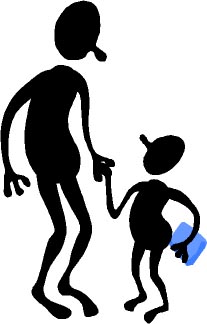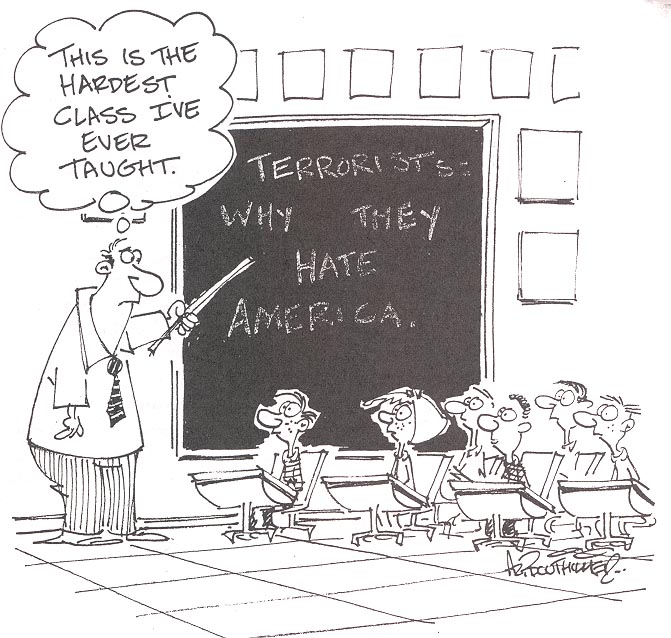 Helping
Kids Cope With Disaster and Tragedy
Helping
Kids Cope With Disaster and Tragedy
 Helping
Kids Cope With Disaster and Tragedy
Helping
Kids Cope With Disaster and Tragedy
Originally developed on 9/13/01 to help teachers help kids deal with the World Trade Center/Pentagon attacks.
It has since been updated to address catastrophes in general.
This
page is designed to help educators help kids cope with the impact of various types of disasters.
Awful things happen on a regular, irregular or single event (short or long term) basis in different parts of the world. Sometimes the traumatizing events are due to forces of nature. At other times, they are created by humans. When catastrophic happenings impact geographic areas, there are families that are minimally affected while others suffer the brunt of the tragic occurence. Children are the most vulnerable among us. They are dependant on older folks who may or may not be prepared, physically and/or psychologically, to mediate and/or lessen the trauma that is experienced.
Consider too, the age of the youngster. Kids at different ages have different cognitive styles and structures for trying to make sense of, and cope with the perplexing and frightening things that are happening around them. Kids don't process events like adults.
At some point, the horrific event subsides, but the psychological impact remains. Kids return to school, but many have been negatively affected by the event. Some show pronounced signs of "post traumatic stress disorder"... They may be more subdued or active. Kids at ages 4 and 5 might have urinary and fecal "accidents" that haven't been present since toilet training. Some seem anxious and distractible. Others seem frightened at all times.
Thank goodness that caring, concerned, and competent educators like you are there to help them move from misinformed, uninformed, malformed or unformed understanding to a more comfortable mental place at which they comprehend the event (at a level that is developmentally appropriate), accept the psychological impact, and have the internal strengths to move forward productively in their lives.
To support you in your mission, this page lists web pages that provide information regarding how to help kids who have been though various types of unfortunate events.
An especially fine site for information on helping traumatized children and youth is maintained by the National Association of School Psychologists at www.nasponline.org This site contains articles regarding how to help kids who have experienced natural disasters, death in the family, terrorism, war zones, school shootings, etc.
Disaster in general
- Recognizing
Post Traumatic Stress Disorder, and helping youngsters deal with it
http://www.aacap.org/publications/factsfam/ptsd70.htm
-Talking with kids about catastrophe:
- When family members of children die
http://www.aacap.org/publications/factsfam/grief.htm
Natural Disasters
- Types of natural disasters and links to resources:
http://www.aap.org/en-us/advocacy-and-policy/aap-health-initiatives/Children-and-Disasters/Pages/Natural-Disasters.aspx
-Helping students & their families cope with natural disasters
http://www.nasponline.org/resources/crisis_safety/naturaldisaster_teams_ho.aspx
- Tips for parents and teachers on helping kids cope with natural disastershttp://www.nasponline.org/resources/crisis_safety/naturaldisaster_ho.aspx
-For professors of education regarding discussion of disasters during class
-To obtain a curriculum
complete with lesson plans on how to prepare for disaster,
contact the Red Cross
and ask for their "Masters of Disaster"
curriculum.
School Shootings (Prevention and Aftermath)
http://www.behavioradvisor.com/BulletProof.html
Terrorism
-Coping
with Terrorism - Helping Children with special needs: Tips for school
personnel and parents http://www.nasponline.org/resources/crisis_safety/helpingchildrencope.aspx

Improving your Ability to Help
& Counsel Kids
(The items below are located on this web site.)
- How to use bibliotherapy (the
therapeutic use of reading)
- An outline of steps to follow when counseling
- How to phrase things when counseling
- How to use play therapy
| Return to the Intervention Strategies Page |
Pup isn't here right now. He's outside in the neighborhood helping kids cope.
| Return to Dr. Mac's home page |
Author: Tom McIntyre, Ph.D. ------ DoctorMac@BehaviorAdvisor.com